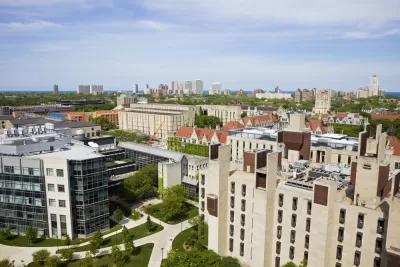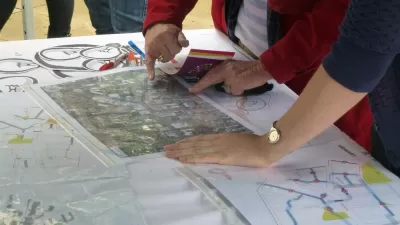Ann Forsyth, professor of urban planning at the Harvard Graduate School of Design, shares insight into common traits of the best educational programs in planning.

What makes a great planning program is an enduring question in planning. Some school have a period at the pinnacle: Penn in the late 1960s and early 1970s; UCLA in the 1980s; and so on. Others rise and fall. What makes a program great to work in for faculty or staff may not have as many benefits for students, and the reverse. However, if asked to propose key features of great programs, I would list the following.
- Students and faculty engaging planning practice and the profession as critical insiders. This can happen in lots of different ways—but involves faculty and students knowing and caring about planning practice and about the role of planning solving important problems in the here and now but with an eye for the long-term. It is about it being aplanningprogram rather than urban studies, public policy, environmental studies, urbanism, and the like even if the program is part of a larger department or school.
- Multiple faculty doing substantial work on how to face important contemporary challenges, making human settlements that are more just and that can sustain meaningful lives in the long term, for example, without obsessing about finding the NEW. In fields like high style architecture or social media the new is paramount. There are many grand pronouncements about ways forward. However, engaging important concerns over the long haul needs a different approach.
- Acknowledgement that there are multiple paths to excellence in planning. Such a program would include faculty and students who represent different approaches. Planning is pluralistic and integrative. It needs generalists who also have specialties across a range of topics. It needs technical and ethical thinking. One could hope that there might be mutual respect and admiration for different camps but acknowledgement or acceptance is a minimum. And by that I mean enough acceptance that people actually learn from each other and don’t just dismiss alternate views, specialties, and methods.
- Four to five faculty who are committed to the good of the whole. There are different ways to do this but one person cannot make a program; three could perhaps do it for a while but burn out. It needs more. This particular dimension can be difficult for students to ascertain but makes a huge difference to the cohesion of the program.
- Students who are committed to creating learning opportunities for themselves and their peers so they can make a difference. Active students can make or break a planning program. Faculty can do some work admitting people who want to learn and make positive changes; they can support a culture of student action. But a lot of it comes down to students being proactive and forward looking.
- Admissions processes need to be designed to create a perfect fit between students and program OR program need to have substantial flexibility and few absolutely required classes. It is easier to do the latter but possible to do the former.
- Finally, the program should have an ethical sense. The program itself should give something back to its local community—however defined--through outreach of various sorts. But mainly it needs to help students prepare for their own role in making the world better in the long term.
Others may have different lists—as might I at some time. Most are variations on engaging core ethical concerns in planning, learning from diversity, playing well with others, and keeping a focus on important issues and the long term. Note that this is not about planning rankings but something a bit more difficult to quantify.
There are also many very good planning programs that do an excellent job producing practicing planners. But a great planning program needs to do something more.

Coming Soon to Ohio: The Largest Agrivoltaic Farm in the US
The ambitious 6,000-acre project will combine an 800-watt solar farm with crop and livestock production.

Pennsylvania Mall Conversion Bill Passes House
If passed, the bill would promote the adaptive reuse of defunct commercial buildings.

U.S. Supreme Court: California's Impact Fees May Violate Takings Clause
A California property owner took El Dorado County to state court after paying a traffic impact fee he felt was exorbitant. He lost in trial court, appellate court, and the California Supreme Court denied review. Then the U.S. Supreme Court acted.

Dallas Surburb Bans New Airbnbs
Plano’s city council banned all new permits for short-term rentals as concerns about their impacts on housing costs grow.

Divvy Introduces E-Bike Charging Docks
New, circular docks let e-bikes charge at stations, eliminating the need for frequent battery swaps.

How Freeway Projects Impact Climate Resilience
In addition to displacement and public health impacts, highway expansions can also make communities less resilient to flooding and other climate-related disasters.
City of Costa Mesa
Licking County
Barrett Planning Group LLC
HUD's Office of Policy Development and Research
Mpact Transit + Community
HUD's Office of Policy Development and Research
Tufts University, Department of Urban and Environmental Policy & Planning
City of Universal City TX
ULI Northwest Arkansas
Write for Planetizen
Urban Design for Planners 1: Software Tools
This six-course series explores essential urban design concepts using open source software and equips planners with the tools they need to participate fully in the urban design process.
Planning for Universal Design
Learn the tools for implementing Universal Design in planning regulations.



























